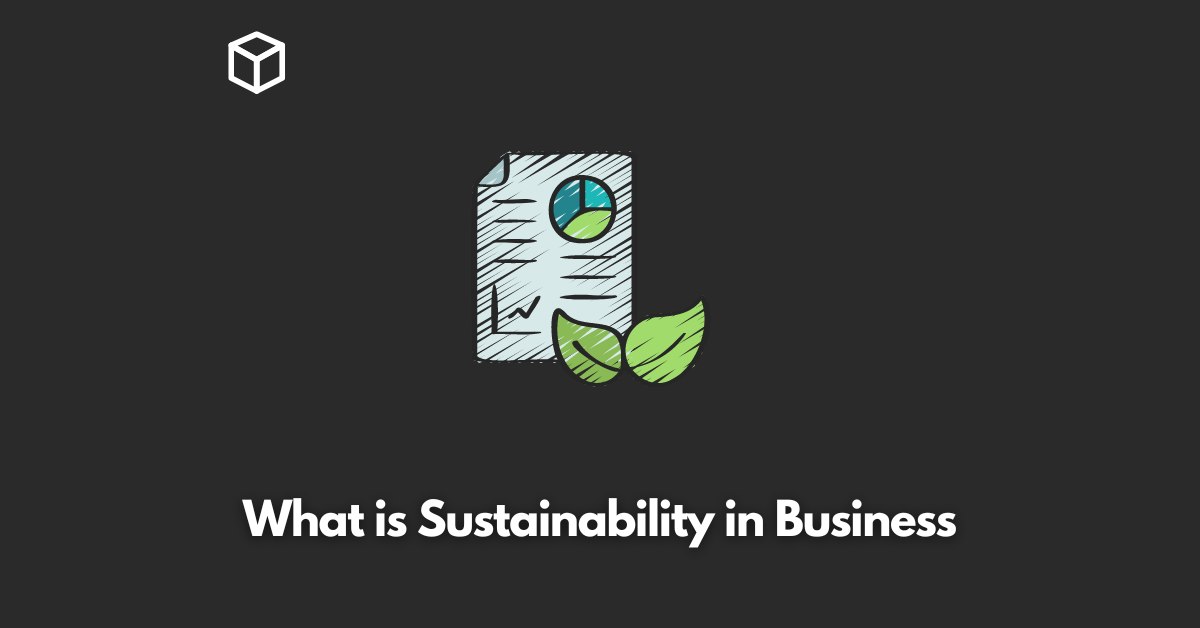As the world becomes increasingly aware of the impact of human activity on the environment, social issues, and economic stability, the concept of sustainability has become a major focus for businesses.
Sustainability in business refers to the practice of balancing the economic, social and environmental aspects of a business in order to create long-term value for all stakeholders.
It is about creating a business model that is not only profitable but also responsible, ethical, and beneficial to society and the environment.
In this article, we will dive into the different aspects of sustainability in business and discuss the benefits and challenges of implementing sustainable practices.
Importance of Sustainability in Business
The importance of sustainability in business can no longer be ignored.
Climate change, social inequality, and economic instability are all major global issues that businesses must take into account.
Companies that fail to consider sustainability in their operations risk losing customers, damaging their reputation, and facing financial penalties.
On the other hand, companies that adopt sustainable practices can improve their bottom line, attract and retain customers, and build a positive reputation.
Environmental Sustainability
Environmental sustainability in business refers to the practice of managing the impact of a business on the natural environment.
This includes reducing waste, conserving energy and resources, and using environmentally friendly materials and processes.
Some examples of environmentally sustainable business practices include recycling, energy efficiency, and renewable energy.
The business case for environmental sustainability is clear.
Implementing sustainable practices can lead to cost savings, improved reputation, and compliance with regulations.
For example, recycling can reduce the amount of waste a company generates, leading to cost savings on disposal fees.
Energy efficiency can lower energy costs and reduce a company’s carbon footprint.
Investing in renewable energy can help a company meet regulations and attract customers who are concerned about the environment.
Social Sustainability
Social sustainability in business refers to the practice of managing the impact of a business on society.
This includes fair labor practices, community engagement, and diversity and inclusion.
Some examples of socially sustainable business practices include fair trade certification, community involvement, and diversity and inclusion programs.
The business case for social sustainability is also clear.
Implementing sustainable practices can lead to improved employee morale, increased customer loyalty, and better relationships with local communities.
For example, fair trade certification demonstrates a commitment to ethical sourcing and can attract customers who are concerned about social issues.
Community involvement can build positive relationships with local communities and improve a company’s reputation.
Diversity and inclusion programs can attract a wider range of talent and improve employee morale.
Economic Sustainability
Economic sustainability in business refers to the practice of managing the financial aspects of a business in order to ensure long-term viability.
This includes financial stability, long-term planning, and responsible sourcing.
Some examples of economically sustainable business practices include long-term planning, responsible sourcing, and financial stability.
The business case for economic sustainability is also clear.
Implementing sustainable practices can lead to increased profitability, the ability to weather economic downturns, and improved investor relations.
For example, long-term planning can help a company identify new opportunities and reduce risk.
Responsible sourcing can improve a company’s reputation and attract customers who are concerned about ethical issues.
Financial stability can provide a buffer against economic downturns and improve investor relations.
Implementing Sustainability in Business
Implementing sustainability in business can seem like a daunting task, but there are steps that companies can take to become more sustainable. Some of these steps include:
- Conducting a sustainability audit: This involves assessing a company’s current practices and identifying areas where improvements can be made.
- Setting sustainability goals: Companies should set clear, measurable goals for improving their sustainability and track their progress.
- Engaging employees: Employees can play a crucial role in implementing sustainability in a business. By educating and engaging employees, companies can create a culture of sustainability within the organization.
- Collaborating with suppliers: Companies can also work with their suppliers to implement sustainable practices throughout their supply chain.
- Communicating with stakeholders: Companies should communicate their sustainability efforts to stakeholders, including customers, investors, and the community.
Examples of companies that have successfully implemented sustainability into their operations include Patagonia, which has a strong commitment to environmental sustainability, and Salesforce, which has a strong commitment to social sustainability.
Conclusion
Sustainability in business is about balancing the economic, social and environmental aspects of a business in order to create long-term value for all stakeholders.
Companies that adopt sustainable practices can improve their bottom line, attract and retain customers, and build a positive reputation.
Implementing sustainability in business can be challenging, but there are steps that companies can take to become more sustainable.
Companies should conduct a sustainability audit, set sustainability goals, engage employees, collaborate with suppliers, and communicate with stakeholders.




